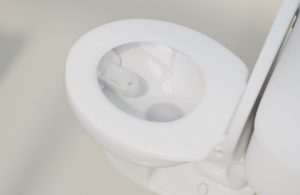impressive reveals of CES 2025 so far:
A 360° AI-powered body scanning health mirror that can scan your heart, weight, and metabolic health
The mirror aspect, which provides a 360-degree scan of your body, looks at your weight, heart and lung health and can even take an electrocardiogram. The Omnia also has a base you stand on (the scale part) that reads health metrics and biomarkers that include blood pressure, heart rate, Vo2 Max and can also read your sleep quality. Using an AI voice assistant, the Omnia can make recommendations based on this data. For example, Omnia may tell you to get more steps in or schedule a doctor’s appointment. It also claims to track metabolic health, so it can read your muscle-to-fat ratio, visceral fat, weight trends and more.
Although Withings says the Omnia won’t be on the market any time soon since it’s currently in development, the brand confirmed it will add some of the newer features to existing products later this year.
Cardio Check-Up is an in-app service for heart health that enables users to receive detailed feedback on their cardiovascular health from board-certified cardiologists within 24 hours.
Housed within Withings+, the company’s subscription-based health improvement service, Cardio Check-up, goes live on the first day of CES 2025 (January 7, 2025) and is powered in the U.S. by Heartbeat Health and by DPV Analytics in France, Germany.
Cardio Check-Up is compatible with all current and future Withings devices with ECG capabilities. These include the hybrid smartwatches ScanWatch, ScanWatch 2, ScanWatch Nova, and the new ScanWatch Nova Brilliant, as well as the Body Scan connected scale, the Move ECG and BPM Core connected monitors, and the groundbreaking 4-in-1 MultiScan checkup device, BeamO.
Other new health tech:
The Hormometer provides actionable insights into critical hormones, beginning with cortisol and progesterone. Imbalances in hormones can have wide-ranging effects, contributing to issues such as chronic stress, fatigue, male and female infertility, weakened immunity, weight fluctuations, disrupted sleep, poor heart and bone health, and accelerated aging.
The Echo Flask features an industry-leading 12-ounce capacity, reducing refill interruptions while delivering consistent hydrogen water. With its advanced proton-exchange membrane technology, the flask achieves a hydrogen concentration up to 8.0 ppm—higher than any hydrogen bottle in the industry. https://echowater.com
https://www.businesswire.com/news/home/20250107541276/en/Echo-Launches-Industry’s-First-Smart-Hydrogen-Bottle-and-App-at-CES-2025
Starling Medical

Device that tracks risk of UTIs and other health conditions
Starling Medical has developed the UrinDx that can monitor certain aspects of a user’s health when they go to the bathroom. UrinDx is an at-home urine monitoring device that sends urinary health information to a care team that determines if there are any clinical concerns, including urinary tract infections.
Wearable sleep monitoring technology
Wis Medical’s tedaid is a wearable biometric monitoring device. It can be used in healthcare facilities or in home monitoring to continuously track essential vital signs, including electrocardiogram, heartbeat, respiratory frequency, oxygen saturation, body temperature, and auscultation.
https://wismedical.io/